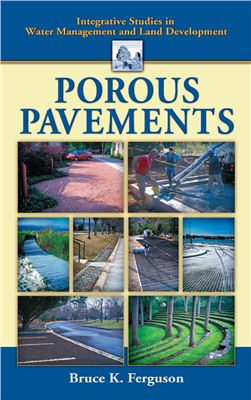CRC Press, 2005, 577 pages, ISBN : 0849326702
Integrative Studies in Water Management and Land Development
Pavements are the most ubiquitous of all man-made structures, and they have an enormous impact on environmental quality. They are responsible for hydrocarbon pollutants, excess runoff, groundwater decline and the resulting local water shortages, temperature increases in the urban "heat island," and for the ability of trees to extend their roots in order to live. Porous pavements, despite their ability to mitigate these factors, remain the object of much skepticism and controversy.
Written by a renowned expert with 25 years of experience in urban watershed management, Porous Pavements is the first comprehensive "encyclopedia" of porous pavement materials.
The book begins with five chapters that lay a foundation for all porous pavement materials and applications, introducing the types of materials and arrangements, their roles in the urban environment, and the principles of pavement structure, hydrology, and rooting space. The following nine chapters outline the costs, maintenance requirements, advantages and disadvantages for different applications, installation methods, sources of standard specifications, and performance levels for each family of porous pavement materials. Relying on case studies and factual data from observed experience, and containing abundant references for further information, Porous Pavements gives responsible practitioners a complete toolbox from which to select the appropriate material for site-specific conditions, providing a "green" alteative to impervious pavements.
Why Make Pavements Porous?
Dimensions of Porous Pavement Installations
Porous Pavement Structure
Porous Pavement Hydrology
Porous Pavement Tree Rooting Media
Porous Aggregate
Porous Turf
Plastic Geocells
Open-Jointed Paving Blocks
Open-Celled Paving Grids
Porous Concrete
Porous Asphalt
Soft Porous Surfacing
Decks
Integrative Studies in Water Management and Land Development
Pavements are the most ubiquitous of all man-made structures, and they have an enormous impact on environmental quality. They are responsible for hydrocarbon pollutants, excess runoff, groundwater decline and the resulting local water shortages, temperature increases in the urban "heat island," and for the ability of trees to extend their roots in order to live. Porous pavements, despite their ability to mitigate these factors, remain the object of much skepticism and controversy.
Written by a renowned expert with 25 years of experience in urban watershed management, Porous Pavements is the first comprehensive "encyclopedia" of porous pavement materials.
The book begins with five chapters that lay a foundation for all porous pavement materials and applications, introducing the types of materials and arrangements, their roles in the urban environment, and the principles of pavement structure, hydrology, and rooting space. The following nine chapters outline the costs, maintenance requirements, advantages and disadvantages for different applications, installation methods, sources of standard specifications, and performance levels for each family of porous pavement materials. Relying on case studies and factual data from observed experience, and containing abundant references for further information, Porous Pavements gives responsible practitioners a complete toolbox from which to select the appropriate material for site-specific conditions, providing a "green" alteative to impervious pavements.
Why Make Pavements Porous?
Dimensions of Porous Pavement Installations
Porous Pavement Structure
Porous Pavement Hydrology
Porous Pavement Tree Rooting Media
Porous Aggregate
Porous Turf
Plastic Geocells
Open-Jointed Paving Blocks
Open-Celled Paving Grids
Porous Concrete
Porous Asphalt
Soft Porous Surfacing
Decks

